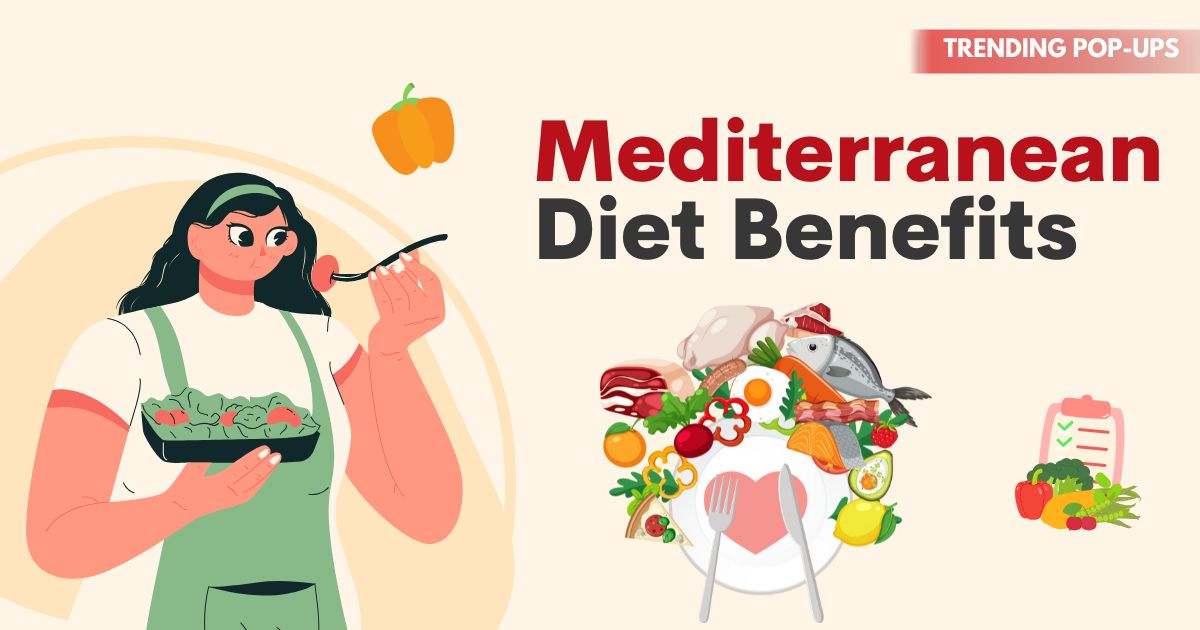The Mediterranean diet is widely recognized as one of the healthiest eating patterns in the world. Rooted in the traditional cuisines of countries bordering the Mediterranean Sea, it emphasizes whole foods, healthy fats, and balanced nutrition. Research has consistently linked this diet to longer life expectancy, improved heart health, and reduced risk of chronic diseases. This article explores the science-backed benefits of the Mediterranean diet for longevity and provides practical tips to adopt it in everyday life.
What is the Mediterranean Diet?
The Mediterranean diet focuses on natural, minimally processed foods and includes:
-
Fruits and vegetables: The primary source of vitamins, minerals, and fiber.
-
Whole grains: Brown rice, whole wheat, quinoa, and barley.
-
Healthy fats: Olive oil as the main fat source; nuts and seeds.
-
Lean proteins: Fish and seafood several times a week, moderate poultry and dairy, limited red meat.
-
Herbs and spices: Garlic, basil, oregano, rosemary for flavor without added salt.
-
Moderate wine consumption: Usually with meals, primarily red wine.
The diet emphasizes balance, portion control, and nutrient-rich foods, which together promote overall health and longevity.
How the Mediterranean Diet Promotes Longevity
Research has shown multiple ways in which this diet contributes to a longer, healthier life:
1. Heart Health Improvement
The Mediterranean diet is rich in monounsaturated fats, primarily from olive oil, which helps reduce LDL cholesterol (“bad cholesterol”) and increase HDL cholesterol (“good cholesterol”). Regular consumption lowers the risk of heart disease, stroke, and high blood pressure.
2. Anti-Inflammatory Properties
Fruits, vegetables, nuts, and olive oil contain antioxidants and anti-inflammatory compounds that reduce chronic inflammation, a key factor in aging and many age-related diseases.
3. Reduced Risk of Chronic Diseases
Following this diet is associated with lower risks of:
-
Type 2 diabetes
-
Obesity
-
Certain cancers
-
Neurodegenerative diseases like Alzheimer’s
This is due to its nutrient-dense foods, healthy fats, and high fiber content.
4. Cognitive Function Preservation
Omega-3 fatty acids from fish, antioxidants from fruits and vegetables, and polyphenols from olive oil support brain health. Studies indicate that adherence to the Mediterranean diet slows cognitive decline and may reduce the risk of dementia.
5. Weight Management
The diet’s emphasis on whole foods, fiber, and healthy fats promotes satiety and supports healthy weight maintenance. Maintaining a healthy weight is strongly linked to longevity.
6. Gut Health Support
High fiber intake from fruits, vegetables, and whole grains encourages a healthy gut microbiome, improving digestion, immune function, and overall metabolic health.
Key Components Contributing to Longevity
1. Olive Oil
Rich in monounsaturated fats and polyphenols, olive oil helps reduce oxidative stress and inflammation, both linked to aging.
2. Nuts and Seeds
Packed with healthy fats, protein, and antioxidants, nuts and seeds lower cardiovascular risk and support metabolic health.
3. Fish and Seafood
Omega-3 fatty acids in fatty fish like salmon, sardines, and mackerel improve heart health and cognitive function.
4. Fruits and Vegetables
Loaded with fiber, vitamins, minerals, and antioxidants, they reduce oxidative damage and chronic disease risk.
5. Whole Grains
Complex carbohydrates provide sustained energy, stabilize blood sugar, and support gut health.
6. Moderate Wine Consumption
Red wine contains polyphenols like resveratrol, which may contribute to heart health and longevity when consumed in moderation.
Tips to Adopt the Mediterranean Diet
-
Start with Olive Oil: Replace butter or margarine with extra virgin olive oil for cooking and dressings.
-
Increase Plant-Based Foods: Fill half your plate with vegetables and fruits at every meal.
-
Choose Whole Grains: Opt for whole-grain bread, pasta, rice, and cereals.
-
Include Fish and Seafood: Aim for 2–3 servings per week; choose fatty fish for omega-3s.
-
Snack on Nuts and Seeds: Almonds, walnuts, and chia seeds are excellent choices.
-
Use Herbs for Flavor: Garlic, basil, oregano, and rosemary enhance taste without added salt.
-
Moderate Red Meat and Dairy: Limit red meat to a few times per month and opt for low-fat dairy.
-
Stay Hydrated: Water is the primary beverage; moderate wine consumption is optional.
Conclusion
The Mediterranean diet is more than just a meal plan—it is a lifestyle choice that promotes longevity, heart health, cognitive function, and overall well-being. By focusing on whole foods, healthy fats, and balanced nutrition, it reduces the risk of chronic diseases, supports mental clarity, and fosters sustainable healthy habits. Incorporating this diet into daily life can be a delicious, practical, and science-backed pathway to a longer, healthier life.
Also Read : Mindful Eating Techniques to Prevent Overeating
FAQs
1. Can the Mediterranean diet help me live longer?
Yes. Studies show that consistent adherence reduces the risk of heart disease, chronic illnesses, and cognitive decline, promoting longevity.
2. Is red wine necessary in this diet?
No, wine is optional. The main benefits come from nutrient-dense foods like fruits, vegetables, olive oil, and fish.
3. Can vegetarians follow the Mediterranean diet?
Absolutely. Plant-based protein sources like legumes, nuts, seeds, and dairy can replace fish and meat.
4. How quickly can I see benefits from this diet?
Some benefits like improved energy, digestion, and mood can appear within weeks, while long-term disease prevention may take months to years.
5. Is the Mediterranean diet suitable for weight loss?
Yes. Its high fiber, healthy fats, and balanced nutrition support satiety, reduce cravings, and promote healthy weight management.



